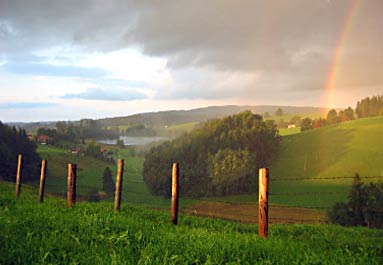This original column is provided free for one-time use with author credit at the end. It may be used for background with author credit. Copyright applies.
#69 FOR IMMEDIATE RELEASE: January 15, 2009
How green is my acre?
By Curtis Seltzer
BLUE GRASS, Va.—Owning country property often raises unsettling questions about personal environmental morality, an idea that did not start with Jimmy Carter’s cardigan sweater and now wants you to squeeze your carbon foot into Greenerella’s
glass slipper.
The specter of environmental catastrophe -- ice caps melting, polar bears stalking dice-rollers in Atlantic City casinos, Vermont Yankees tapping palm trees -- is moving us toward a “green economy” and a greener lifestyle.
If you’re living in the country or considering buying a place out here, you may want to think about how green you want to be…and how much you want to pay for it. As in many other efforts to change our ways, the first dollars invested in greenery yield the biggest improvements while the last increments of getting there often come in costly baby steps.
Here are some major considerations.
Transportation. You can’t live in or visit the country without at least one vehicle.
If snow and mud are seasonal companions, you’ll need an all-wheel-drive or 4WD-vehicle for mobility and safety. Generally speaking, the heavier these beasts, the more they eat, the more expensive they are to maintain and the less green they are by every measure.
A small, 4WD-drive, gasoline-powered truck is probably your best all-purpose country vehicle at this time. The Toyota Tacoma and Nissan Frontier have high ratings.
Full-size, gasoline pickups are expensive to buy and operate, handle badly and have big carbon footprints. (I write as an owner.) You will need one if you’re hauling trailers. Otherwise, smaller pickups are cheaper, greener and generally able to do the same job at lower cost.
No diesel-powered, small pickups are available, even though these engines are now greener than gasoline equivalents. Large pickups are available with diesels, starting at about $38,000, though they can hardly be considered green. The two hybrids available --Chevy Silverado 1500 and GMC Sierra 1500 -- are full-size trucks that start at the same $38,000.
Second homes, green or not? If you own a second home, you inevitably use more energy, have a bigger carbon footprint and carry a bigger environmental impact than if you had only one. Some environmentalists oppose second-home ownership for these reasons, although many environmentalists I know own second homes because of their environmental sentiments. Consistency can be the hobgoblin of minds yearning to be green.
I’ve noticed second-home owners using a small car for going back and forth. Some keep an old truck at the country place to do the things that only a truck can do and only an old one can do properly and memorably, though, alas, not greenly.
Energy around the county place. The more petroleum-based engines you have, the more fuel you will use and the bigger carbon footprint you create.
Older tractors are not fuel efficient, but if you have limited tractor needs, a used tractor in decent shape is much more dollar efficient than a new one. It doesn’t make much sense to spend $25,000 for a new, fuel-efficient tractor if you only use it 25 hours a year. You might use ten gallons less fuel for the work you do, but it comes at the cost of buying $20,000 more tractor than you really need.
New diesel tractor engines are likely to be greener than new gasoline tractor engines. Old engines of both types are not green, except under the influence of green eyeshades.
No solar-electric, hybrid or plug-in farm tractors are available though some are in the works. DIY solar tractors have been jiggered together; they work, but they’re expensive. GE used to make an electric lawn tractor under the name Elec-Trak, which now has a cult following.
Lawn tractors, chainsaws, ATVs and the like don’t use much fuel or generate much CO2 individually, but do collectively. The carbon footprint of my gasoline lawn tractor provided three identifiable excuses for not cutting the grass in 2008. Riding around like a zombie 12 times last year rather than 15 is one of my small steps toward keeping the walrus on Artic ice.
Human energy is green, and it can substitute for some farm and country tasks. But you have to factor in your tolerance for, and ability to do, hard work by hand. I split six to seven cords of firewood by hand every year instead of using a gasoline-powered hydraulic splitter. I would never consider sawing this wood manually—it’s too hard and too time-consuming. Some handwork substitution appeals to me, but I have no interest in reenacting the 17th Century.
While some might argue that boats on the Volga River should still be dragged upstream by gangs of men harnessed to a rope, I endorse using a diesel engine. I also oppose shipping stuff across oceans using galley slaves.
Country houses. These structures and outbuildings are usually candidates for improving heating efficiency.
Structures can be built or retrofitted to use much less energy, and they can be powered with green energy through wind and solar technologies. Complete energy self-sufficiency is possible, but it usually comes at a very high initial cost—in the neighborhood of $50,000 to $60,000. A mixed system -- some site-generated energy, some drawn from the grid or a tank -- costs less and is more practical in most cases, though it’s less green.
Photovoltaic panels and batteries are still not cheap enough to make the green choice the obvious economic choice. When money is no object, it’s very easy to be perfectly green and live in the world’s greenest house.
Firewood. Country houses are often heated with firewood. Is burning firewood green? Is it a carbon-neutral activity? Does it pollute the air? Is wood heat greener than heating with natural gas, fuel oil, coal-fired electricity, nuclear-powered electricity or hydro-electric power?
Answers for each comparison depend on how the firewood is harvested; whether it’s burned green or dry, in a fireplace or a woodstove; the degree of woodstove efficiency and the extent to which it diminishes exhaust gases and particulates. A heated discussion is taking place over how carbon-neutral wood fuel is, which, if nothing else, warms our fingers carbon-free as hundreds post comments pro and con.
An informative site is http://www.woodheat.org, a non-profit focused on the responsible use of wood as a home-heating fuel. The EPA’s current woodstove ratings are at http://www.epa.gov/compliance/resources.
Going green in the country costs money. Much of the old capital stock we use to do things and produce stuff is inefficient and generates a lot of carbon. Greener capital stock is still prohibitively expensive in most cases for most people. Greener alternatives -- as obvious as a small diesel pickup or hybrid farm tractor -- are still not on the market.
While nothing much has come out of the Kubotas and John Deeres, a grass-roots movement of tinkerers with the imaginations of Leonardo da Vinci is fabricating green farm machines and self-sufficient energy systems in their backyards. They’ve been smuggling these ideas into our collective unconsciousness for years.
Greening up the country is one part of going greener nationally. Can we become greener faster in a cost-effective way? And will we be clever enough in greening ourselves to offset the increasing demand for stuff that a growing population requires?
Hard questions usually have harder answers.
Contact: Curtis Seltzer, Ph.D.
Land Consultant
1467 Wimer Mountain Road
Blue Grass, VA 24413-2307
540-474-3297
curtisseltzer@htcnet.org
www.curtis-seltzer.com
This original column is provided free for one-time use with author credit at the end. It may be used for background with author credit. Copyright applies.
|









